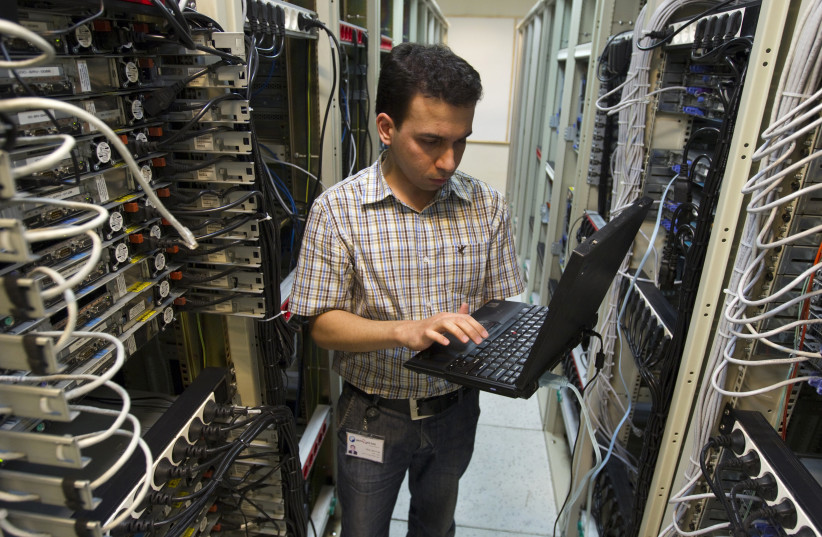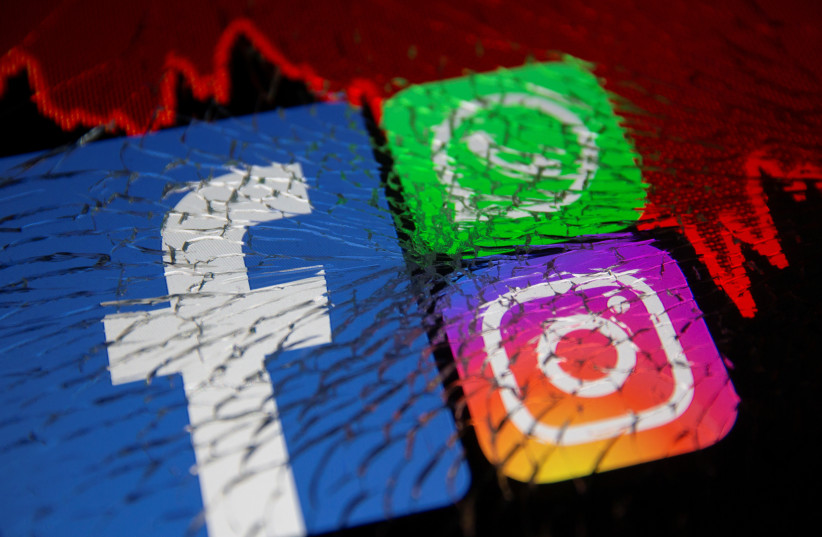Let enough people rely on just one or two tech giants for everything they do and you create a Pearl Harbor-like vulnerability.
The impressive trajectory of the Internet age and social media’s dominance of how we get our information was put on display Monday night when Facebook and its companies, Instagram and WhatsApp, crashed worldwide.
Large swaths of the world rely on these platforms and services, which are largely unregulated by governments, to send messages, make calls, receive information and coordinate meetings and daily life.
This is not just a small part of people’s lives in the modern age. The age of the Internet has rapidly shifted power into the hands of a few large tech giants that operate as monopolies for hosting, distributing and disseminating information.
However, they also control other networks that increasingly serve as stand-ins for phone networks.

A computer engineer checks equipment at an internet service provider in Tehran February 15, 2011 (credit: CAREN FIROUZ / REUTERS)
When the Internet age began in the 1990s, it provided a radical new way for people to access information; previously, there was only print media, television and radio. The nature of the Internet, interactive in ways the other three weren’t, meant it rapidly began to inhabit a multiplicity of places in people’s lives that hitherto were not thought possible.
Soon after, the Internet provided an alternative way to watch television – streaming sites and YouTube. This quickly became true for radio and other mediums. News went online, battering major legacy media and challenging its survival. Product sales, or shopping, moved online, as did the creation of portals for people to chat, message, communicate and create virtual versions of themselves.
The most recent revolution has been the binding of these various elements under the power of Big Tech companies – like Facebook. What this means is that while the Internet age of the late 1990s and early 2000s was a unique free-for-all Wild West, the new age reflects more the era of the robber barons of the US in the late 19th century – the monopolies and trusts that came to dominate the industry through horizontal and vertical integration.
Big Tech companies are so large they now have gobbled up swaths of the Internet and control the way in which most information and communications flow.
AN OUTAGE like the one that occurred on Monday is not unprecedented. Various large Big Tech sites have crashed in the past, usually for a short time. There has also been an increase in cyber incidents over the last few years, including cyberattacks that have targeted critical infrastructure, whether in Israel, the US or other places.
The question that should be asked increasingly by governments is how they can replicate or maintain communication and major Internet systems in case of an outage among major companies that are too big to fail.
This is not an arbitrary thought experiment.
The world is entering an era of uncertainty, reflected not only in the pandemic, but also in great power competition. This is because the world order that emerged after the Cold War, which led to the global dominance of the United States, has now shifted to a league of authoritarian countries that are at odds with Washington and Western democracies.
Most of them also censor certain parts of the Internet or fear widespread citizen use of it as a whole. This includes Turkey, Iran, China, Russia and other states.
Big Tech companies often must weigh the demands of authoritarian regimes to crack down on them, balancing them with their own budgets and business goals. This means, in some cases, succumbing to the authoritarians.
For example, Big Tech companies, after complaints from Western leaders, have labeled some information as “misinformation” in order to do what they deem is a public service during the pandemic. They might also sometimes cater to the authoritarian request to remove groups linked to dissidents in places like Turkey. They must struggle with those questions.
Large authoritarian regimes may realize that Big Tech is the soft underbelly of the Western democracies. Let enough people rely on just one or two tech giants for everything they do, and you create a Pearl Harbor-like vulnerability. The exception is that in this case, it’s even bigger than a Pearl Harbor incident because it sits astride so much of what happens in the world.
IN A future rife with growing conflict between the US and other regimes, will Big Tech be a target? And how will it respond if it is not regulated and closely monitored by governments that have an interest in maintaining its security?
Do groups of countries like the Five Eyes (Australia, Canada, New Zealand, UK and US) have an interest in protecting the workings of things like WhatsApp, for instance?
While it is true that the corporations that run these platforms are private, Western governments have understood that when it comes to large corporate networks – whether phone companies, radio, rail or transportation – even if some aspects of the industry are private, there is a need to use these industries in times of peril.
For this very reason, there is an emergency broadcast system in the US. Governments that value the role Big Tech has in our lives would be smart to begin to think about how to step in and maintain these systems should they be under attack or go “dark” in the future.
They should consider duplicating or archiving these systems, rather than relying on private corporations to do so. There is no doubt there is already a partnership between major governments and Big Tech because messaging, such as relating to vaccines, is already part of the way large Western governments encourage Big Tech to disseminate information. There is already a dialogue.
Unregulated and without checks and balances on their operation, Big Tech could be a threat to the West; this revelation is one of the important lessons of the recent outage.
- Karlston
-

 1
1



Recommended Comments
There are no comments to display.
Join the conversation
You can post now and register later. If you have an account, sign in now to post with your account.
Note: Your post will require moderator approval before it will be visible.